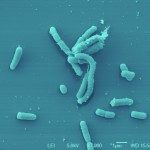Lien vers Pubmed [PMID] – 33291818
Lien DOI – E163710.3390/biom10121637
Biomolecules 2020 Dec; 10(12):
Yersinia pseudotuberculosis, Y. enterocolitica and Y. pestis are pathogenic bacteria capable of causing disease in humans by growing extracellularly in lymph nodes and during systemic infections. While the capacity of these bacteria to invade, replicate, and survive within host cells has been known for long, it is only in recent years that their intracellular stages have been explored in more detail. Current evidence suggests that pathogenic Yersinia are capable of activating autophagy in both phagocytic and epithelial cells, subverting autophagosome formation to create a niche supporting bacterial intracellular replication. In this review, we discuss recent results opening novel perspectives to the understanding of intimate host-pathogens interactions taking place during enteric yersiniosis and plague.


